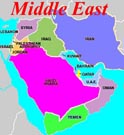Israeli tanks, troops battle into Gaza Strip
 Tel Aviv/Gaza - The first several hours of Israel's long- expected ground invasion saw fierce fighting as tanks arrived early Sunday at Gaza City and troops advanced to Beit Lahia and Beit Hanoun in the northern Gaza Strip.
Tel Aviv/Gaza - The first several hours of Israel's long- expected ground invasion saw fierce fighting as tanks arrived early Sunday at Gaza City and troops advanced to Beit Lahia and Beit Hanoun in the northern Gaza Strip.
Launched late Saturday, Israeli infantry and armour, backed by air support, moved into the north of the territory after an artillery barrage lasting hours. Early casualty reports were sketchy.
Palestinian militants immediately confronted the Israelis, sparking what the Islamic Hamas movement, which controls Gaza, said in a statement were "heavy and tough exchanges of fire and armed clashes."
Hamas' armed wing, the al-Qassam Brigades, said in its own statement that the Israelis were falling into "the trap that our fighters had prepared for its soldiers and tanks."
Reports from inside the strip described explosions, heavy machine- gun fire and shelling by Israeli tanks. The preceding bombing campaign continued overnight, and television footage from Gaza showed fires and billowing smoke.
The Israeli military said the ground operation was the second stage of the Israeli offensive, which began December 27, and was intended to destroy Hamas installations in the area of operations and to impede militants' firing of rockets at Israel.
The military said in a statement that the ground operation was not aimed at the residents of Gaza but noted that "anyone who hides a terrorist or weapons in his house is considered a terrorist."
Israeli Defence Minister Ehud Barak warned in a televised statement Saturday night that the ground campaign would be neither easy nor short.
The entry of ground troops into Gaza had been expected for days, after Israel called up and deployed thousands of reservists along the border, while the air offensive continued unabated.
Israeli government spokesman Mark Regev told Arabic broadcaster al-Jazeera: "We have no intention of reoccupying the Gaza Strip. We did not pull out of Gaza in 2005 to return on the New Year's Eve in 2009."
He insisted that the ground operation "is not offensive but defensive. If there were not rockets raining down on our civilian people in the southern part of the country, we would not have to act."
The Israel Air Force (IAF) attacked 40 targets Saturday in the Gaza Strip, and Militants in the enclave continued launching rockets at the Jewish state even with the invasion underway.
In the first hours of the ground assault, at least 30 Hamas fighters were killed, according to Israeli army sources. BBC and al- Jazeera each reported Hamas casualties of four dead, citing Palestinian sources.
There were no official reports of casualties from Israeli forces, though Hamas claimed to have killed nine soldiers. Palestinian civilian casualties overnight in the densely populated Gaza Strip were unknown.
For the first time since the offensive began one week ago, Israeli artillery guns positioned along the border opened up in the late afternoon in what turned out to be a "softening up" prior to the ground incursion.
The artillery barrage continued for several hours. It was unclear whether it was an artillery shell or an airstrike that hit a mosque in the late afternoon in the northern strip, killing 11 Palestinians and wounding 50 others, 24 of them seriously. The Israeli military has accused Palestinian militants of using mosques as weapons depots and even as rocket-launching bases.
An IAF strike early Saturday killed a top Hamas commander, the third high-ranking leader of the Islamist group to be slain in the eight days of the Israeli offensive. Zakaria al-Jamal was a battalion commander in the Hamas military wing and head of the movement's rocket-launching squads in Gaza City, the Israeli military said.
Other targets hit in the IAF strikes included a college, which the military statement said had been used as a rocket-launching base, and the homes of two Hamas militants. One home had been used as a weapons depot and the other as a meeting place to plan attacks, the IAF statement said.
Four Palestinians were killed in a strike on Rafah in southern Gaza, bringing Saturday's death toll to at least 19.
Reports from Gaza said Israeli aircraft attacked two bridges in the centre of the strip, making movement harder between the south of the enclave and Gaza City in the north.
Gaza militants continued to launch rockets and mortar shells at Israel, with around 15 attacks reported including six with long-range Grad missiles.
One Grad hit a building in the port city of Ashdod, slightly wounding two people and causing damage to the building.
Israel launched its "Operation Cast Lead" in response to a week of heavy rocket barrages on the Jewish state out of the Gaza Strip, following the end of a shaky six-month truce between Israel and Hamas leaders in the territory.
Some 461 Palestinians have been killed in the hundreds of Israeli strikes and around 2,300 wounded.
The approximately 450 Palestinian rockets and mortars launched since the start of the operation have left four Israelis killed, three of them civilians, and dozens more wounded.
The United Nations Relief and Works Agency (UNRWA) has said that at least a quarter of the Palestinian casualties are civilian.
In New York, the United Nations held an emergency meeting after the start of the Israeli invasion but was unable to reach agreement on a resolution. (dpa)